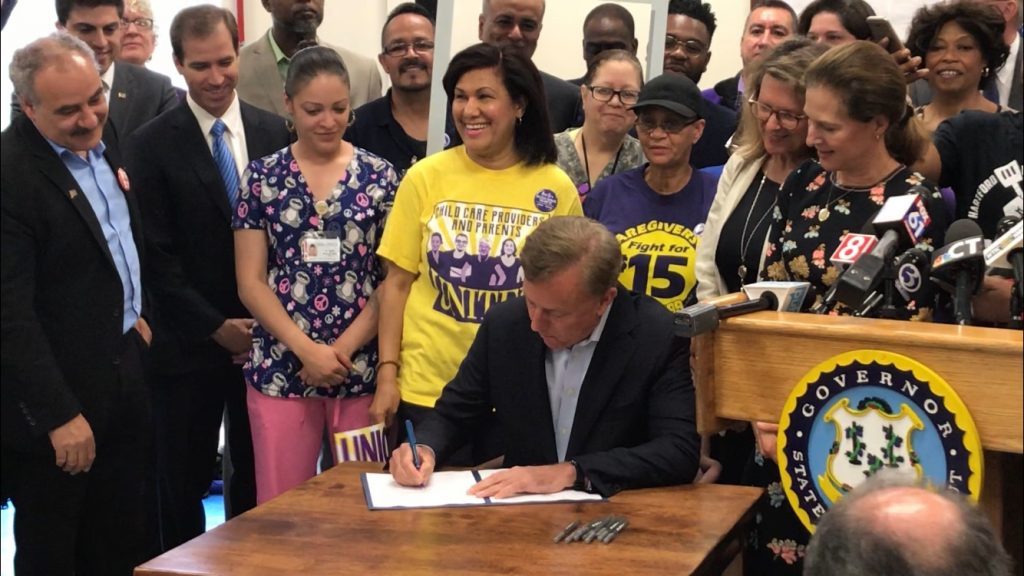HARTFORD, CT) – Governor Ned Lamont this morning signed legislation he championed alongside a number of state legislators that will increase the minimum hourly wage in Connecticut to $15.00 through a series of gradual increases over the next several years, with the first one taking place this October. After the scheduled increases take effect, the new law requires the minimum wage to grow according to federal economic indicators, so everyone can continue to share in Connecticut’s prosperity.
The governor signed the law at the Parkville Care Center in Hartford, where he was surrounded by advocates, working men and women, business leaders, and legislators, including State Senator Julie Kushner (D-Danbury) and State Representative Robyn Porter (D-New Haven), the co-chairs of the labor and public employees committee who passionately led the approval of the bill through the state legislature.
“This is perhaps one of the most impactful pieces of legislation for working families that a governor can sign, and I am proud to place my signature on this law because it is the right thing to do,” Governor Lamont said. “With this new law, thousands of hardworking women and men – many of whom are supporting families – will get a modest increase that will help lift them out of poverty, combat persistent pay disparities between races and genders, and stimulate our economy. This is a fair, gradual increase for the working women and men who will invest the money right back into our economy and continue supporting local businesses in their communities.”
The new law requires the minimum wage to increase from its current level of $10.10 to:
· $11.00 on October 1, 2019;
· $12.00 on September 1, 2020;
· $13.00 on August 1, 2021;
· $14.00 on July 1, 2022; and
· $15.00 on June 1, 2023.
The Connecticut Department of Labor and Connecticut Voices for Children estimate those increases will raise wages for approximately 130,000 workers this year and more than half a million by 2024.
Ultimately, beginning January 1, 2024, the law requires the minimum wage to become indexed to the employment cost index, which is calculated by the U.S. Department of Labor.
“Raising the minimum wage will address persistent pay disparities between different races and help bring us closer to eliminating the gender pay gap,” Lt. Governor Susan Bysiewicz said. “Nearly 60 percent of minimum wage earners in Connecticut are women. There are 170,000 households headed by women, and if we want to grow our economy we need to ensure that women have the financial security they need to provide for their families.”
(Office of the Governor Press Release)
El gobernador firma la caminata de salario mínimo
HARTFORD, CT)-El gobernador Ned Lamont esta mañana firmó la legislación que defendió junto a una serie de legisladores estatales que aumentarán el salario mínimo por hora en Connecticut a $15,00 a través de una serie de aumentos graduales en los próximos años, con el primera que se celebrará este mes de octubre. Después de que los aumentos programados surtan efecto, la nueva ley requiere que el salario mínimo crezca de acuerdo con los indicadores económicos federales, para que todos puedan seguir comparten la prosperidad de Connecticut.
El gobernador firmó la ley en el Parkville Care Center en Hartford, donde estuvo rodeado de defensores, hombres y mujeres trabajadores, líderes empresariales y legisladores, incluyendo la senadora estatal Julie Kushner (D-Danbury) y la representante del estado Robyn Porter (D-New Haven), los copresidentes del Comité de trabajadores y empleados públicos que apasionadamente lideraron la aprobación del proyecto de ley a través de la legislatura estatal.
“Esta es quizás una de las piezas legislativas más impactantes para las familias trabajadoras que un gobernador puede firmar, y estoy orgulloso de poner mi firma en esta ley porque es lo correcto”, dijo el gobernador Lamont. “Con esta nueva ley, miles de mujeres y hombres trabajadores – muchos de los cuales apoyan a las familias – tendrán un modesto aumento que les ayudará a levantarlos de la pobreza, combatir las persistentes disparidades salariales entre razas y géneros, y estimular nuestra economía. Este es un aumento justo y gradual para las mujeres trabajadoras y los hombres que invertirán el dinero de nuevo en nuestra economía y seguirán apoyando a las empresas locales en sus comunidades. ”
La nueva ley exige que el salario mínimo aumente de su nivel actual de $10,10 a:
· $11,00 el 1 de octubre de 2019;
· $12,00 el 1 de septiembre de 2020;
· $13,00 el 1 de agosto de 2021;
· $14,00 el 1 de julio de 2022; Y
· $15,00 el 1 de junio de 2023.
El Departamento de trabajo de Connecticut y las voces de Connecticut para niños estiman que esos aumentos elevarán los salarios de aproximadamente 130.000 trabajadores este año y más de medio millón por 2024.
En última instancia, a partir del 1 de enero de 2024, la ley exige que el salario mínimo se indexe al índice de costos de empleo, que es calculado por el Departamento de trabajo de los Estados Unidos.
“Elevar el salario mínimo abordará las disparidades salariales persistentes entre las diferentes razas y ayudará a acercarnos más a la eliminación de la brecha salarial de género”, dijo la vicegobernadora Susan Bysiewicz. “Casi el 60 por ciento de los asalariados mínimos en Connecticut son mujeres. Hay 170.000 hogares encabezados por mujeres, y si queremos hacer crecer nuestra economía tenemos que asegurarnos de que las mujeres tengan la seguridad financiera que necesitan para proveer a sus familias. ”
(Comunicado de prensa de la oficina del gobernador)

